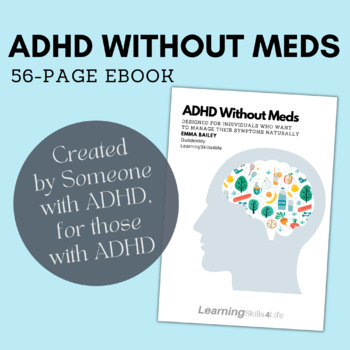Managing ADHD Naturally: Diet, Exercise, And Lifestyle Changes

Table of Contents
Optimizing Your Diet for ADHD Management
Diet plays a crucial role in managing ADHD symptoms. What you eat directly impacts brain function, energy levels, and overall mood – all key factors influencing ADHD.
The Impact of Sugar and Processed Foods
Refined sugar and processed foods are often linked to increased hyperactivity, inattention, and impulsivity in individuals with ADHD. These foods cause rapid spikes and crashes in blood sugar levels, leading to energy fluctuations and difficulty concentrating. The resulting blood sugar crash leaves you feeling sluggish and unable to focus, exacerbating ADHD symptoms.
- Foods to avoid:
- Sugary drinks (soda, juice)
- Processed snacks (chips, candy)
- White bread and pastries
- Artificial sweeteners
Instead, opt for:
- Whole grains (brown rice, quinoa, oats)
- Fruits and vegetables (rich in vitamins and antioxidants)
- Lean proteins (fish, poultry, beans)
Nourishing Your Brain with Essential Nutrients
A balanced diet rich in essential nutrients is vital for optimal brain function and ADHD management. Specific nutrients play a crucial role:
- Omega-3 fatty acids: Found in fatty fish (salmon, tuna), flaxseeds, and chia seeds, these are crucial for brain health and reducing inflammation.
- Iron: Iron deficiency can contribute to fatigue and cognitive difficulties. Good sources include leafy green vegetables, red meat, and beans.
- Zinc: Essential for neurotransmitter function and cognitive performance. Found in nuts, seeds, and legumes.
A diet rich in protein and complex carbohydrates provides sustained energy and helps stabilize blood sugar levels, preventing those detrimental crashes. While a balanced diet is key, some individuals may benefit from supplements. Always consult your doctor before starting any supplements.
The Power of Exercise for ADHD
Physical activity is a powerful tool in managing ADHD symptoms. Exercise isn't just about physical health; it significantly impacts brain function and mood.
Physical Activity and Brain Function
Regular exercise boosts levels of dopamine and norepinephrine, neurotransmitters crucial for focus, attention, and motivation. This natural boost can significantly improve cognitive function and reduce impulsivity.
- Beneficial Exercise Types:
- Cardiovascular exercise (running, swimming, cycling)
- Strength training
- Yoga and other mind-body practices
Finding activities you enjoy is key to establishing a consistent routine. The positive impact on mood and stress reduction further contributes to better ADHD management.
Creating an Exercise Routine
Creating a sustainable exercise routine can be challenging with ADHD. Start small and build gradually:
- Strategies for Motivation:
- Set realistic, achievable goals.
- Find a workout buddy for accountability.
- Track your progress to celebrate achievements.
- Incorporate movement throughout the day – take breaks, walk during lunch.
Lifestyle Changes for Improved ADHD Management
Beyond diet and exercise, lifestyle adjustments significantly influence ADHD symptom management.
The Importance of Sleep Hygiene
Sufficient sleep is paramount for regulating brain function and managing ADHD symptoms. Sleep deprivation exacerbates inattention, impulsivity, and emotional dysregulation.
- Improving Sleep Quality:
- Maintain a consistent sleep schedule.
- Establish a relaxing bedtime routine (avoid screens before bed).
- Create a conducive sleep environment (dark, quiet, cool).
Stress Management Techniques
Stress significantly exacerbates ADHD symptoms. Implementing stress-reduction techniques is crucial:
- Effective Stress Management Strategies:
- Mindfulness meditation
- Deep breathing exercises
- Yoga and Tai Chi
- Spending time in nature
Mindfulness and Cognitive Behavioral Therapy (CBT)
Mindfulness and CBT are therapeutic approaches that can significantly improve ADHD management. These techniques help improve self-awareness, emotional regulation, and impulse control. Consult a mental health professional for guidance on these therapies.
Conclusion
Managing ADHD naturally through dietary changes, regular exercise, and positive lifestyle modifications offers a powerful path towards improved focus, reduced impulsivity, and enhanced overall wellbeing. By implementing the strategies outlined above – focusing on brain-boosting nutrition, incorporating regular physical activity, and prioritizing sleep and stress management – you can significantly improve your ability to manage your ADHD symptoms. Remember to consult with your healthcare professional before making significant dietary changes or starting any new exercise program. Take control of your ADHD and start living a healthier, more fulfilling life by adopting a holistic approach to managing ADHD naturally.

Featured Posts
-
 Harvard University And The Trump Administration A Legal Battle Over Federal Funding
Apr 29, 2025
Harvard University And The Trump Administration A Legal Battle Over Federal Funding
Apr 29, 2025 -
 Parita Sul Posto Di Lavoro Progressi Lenti Ma Costanti
Apr 29, 2025
Parita Sul Posto Di Lavoro Progressi Lenti Ma Costanti
Apr 29, 2025 -
 Fhi Rapport Begrenset Effekt Av Adhd Medisin Pa Skole
Apr 29, 2025
Fhi Rapport Begrenset Effekt Av Adhd Medisin Pa Skole
Apr 29, 2025 -
 British Paralympian Missing In Las Vegas Urgent Search Underway
Apr 29, 2025
British Paralympian Missing In Las Vegas Urgent Search Underway
Apr 29, 2025 -
 British Paralympian Missing In Las Vegas A Week Without Contact
Apr 29, 2025
British Paralympian Missing In Las Vegas A Week Without Contact
Apr 29, 2025
